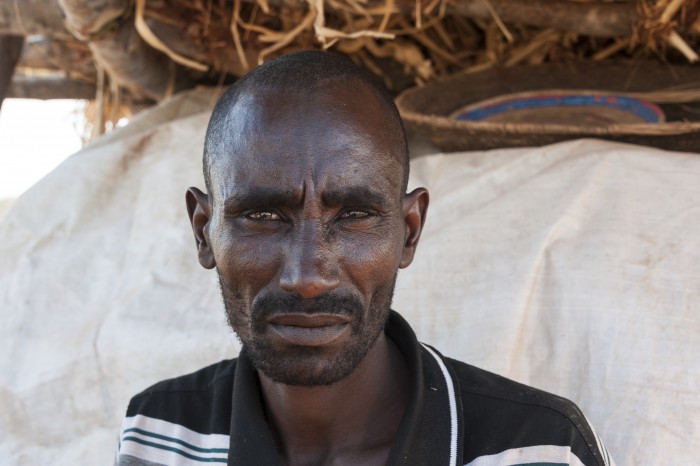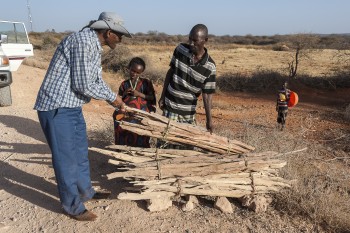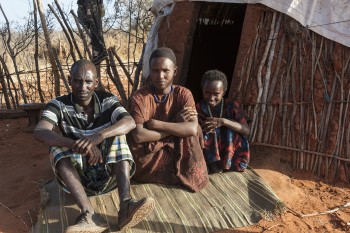
Looming famine
In the highlands of Bale region in Ethiopia, the grain harvest is in full swing. Roads are busy with modern agricultural machinery the grain is harvested large scale. Only 100 kilometers away, in the dry plains a major famine is looming. During the previous rainy season there was so little rain that the crops of many farmers failed.
Failed crop
Mohammed Ismail’s crops also failed. Together with his wife Zahara Hussein and their two children they live in his field. “Last year in the rainy season, I sowed the first teff (a cereal). However, there wasn’t enough rain. There was only rain in September; normally there is also rain in August and October. My crop failed completely. Teff is a cereal that has a good yield; it is used to make enjerra (a kind of pancake). I had hoped to earn good money by selling a portion of the harvest. Now I have no income and no harvest to feed my family. I can only harvest some corn and sorghum, which I also had on my land. ”
 Selling wood and working as a carrier
Selling wood and working as a carrier
In order to bridge the period until the next rainy season and harvest, Mohamed must find other solutions. “I must somehow get money to buy food and other necessities for my family. I have a few goats, a cow, an ox and a donkey. If I buy a goat, I can earn 500 birr (20 euro). I also gather wood in the forest and make charcoal from it. Twice a week I go to the market in order to sell my wood and charcoal. I also work there as a cargo carrier for some extra income. In future, my field must produce better crops. I use the excrement of my animals to fertilize the land. I have also planted a papaya and a mango tree. They are drought-resistant and will hopefully yield fruit in a few years.”
A three-hour walk to fetch water
Due to the food shortage in the region, the food is very restricted. This also goes for the Mohamed family. “We mainly eat bread. We buy it in the market, or we bake it ourselves. We also make porridge from maize flour. For the children I buy camel milk. My wife is pregnant with our third child. If possible, I try to buy her an extra-rich diet, which she can prepare with water. In the dry season we unfortunately have to walk very far to fetch water, it takes me more than 3 hours to fetch it. ”
 Hoping to get food aid from the government
Hoping to get food aid from the government
Muhammad and his family have not yet had government aid. “In the past we did get aid. Recently, a government official came by to ask for information about our situation. So we hope we will be getting part of the monthly food distribution from the government. Then we will at least get flour and oil. ”
Emergency Relief from Kerk in Actie
The emergency relief that ACT members Kerk in Actie and EECMY provides, is distributed in coordination with the local government. Such emergency relief can help people like Mohamed and his family to survive until the next harvest.
Planting fruit trees
Mohamed hopes in future no longer to be dependent on this aid. “By planting fruit trees that are drought-resistant and by fertilizing my land, I hope to create a better situation and to be able to withstand drought better.”
Text: Mariken Stolk